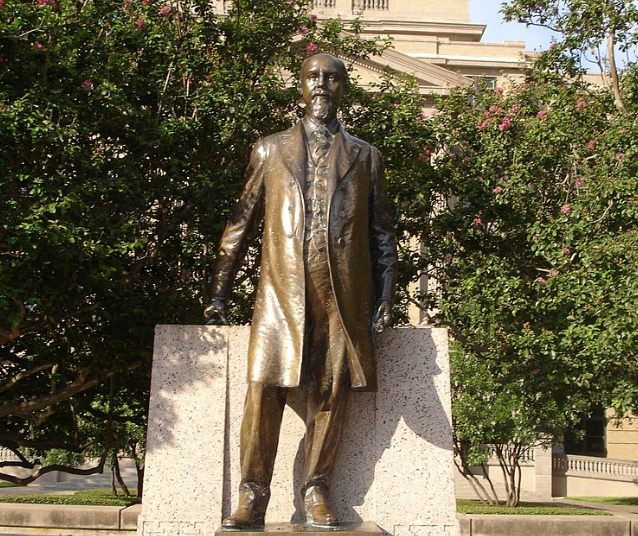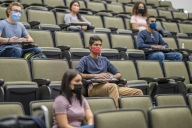You have /5 articles left.
Sign up for a free account or log in.

Lawrence Sullivan Ross statue at Texas A&M
Wikimedia Commons
Texas A&M University in College Station reportedly disciplined one professor and terminated another for classroom misconduct, following investigations that originated with speech complaints against them.
Filipe Castro, Frederick R. Mayer Fellow II of Nautical Archaeology, who was reportedly fired, was found to have failed to meet his responsibilities to A&M and students, and to have created a negative learning environment, according to records first obtained by The Eagle. The university determined that Michael Alvard, the associate professor of anthropology who was censured, failed to teach in an “unbiased and respectful” manner.
Both professors attracted attention last summer with their criticism of A&M’s long-standing statue of a Confederate army general, Lawrence Sullivan Ross. Alvard was arrested in June for crossing a line the university set up to separate protesters against the statue from counterprotesters who want the statue to remain, citing Ross's roles as former Texas governor and president of A&M’s precursor institution, the Agricultural and Mechanical College of Texas.
Alvard said at the time that the campus area between the two groups was public property, so he wasn’t trespassing. Following his arrest, he wrote on Facebook that Texas A&M had previously allowed white supremacist Richard Spencer to speak there yet arrested a professor during a peaceful protest.
“Whose side are they on?” Alvard wrote of the university.
Castro, who also supported the statue’s removal, told A&M’s student newspaper, “Why do we want a statue that stands for racism and exclusion and hatred? Statues are just artifacts, they are not history … History is in the library. If you really want to know the history of the Confederacy, go to the library.”
Conservative websites have since cataloged some of Castro’s social media comments, including those criticizing President Trump and a 2019 Facebook post in which Castro complained about unnamed political student activists’ “militant ignorance.” Students “should be encouraged to get their facts straight before their pastors and pundits go on distorting them for political ends,” he wrote.
When someone else commented that these students needed a re-education camp with Red Guards, Castro responded, “You just gave me a great idea!!!”
He’s also harshly criticized Israel.
Last year, in response to a Facebook post by The Palestine Project, a pro-Palestine organization, for instance, Castro wrote, “Racist, savage creeps. The same hatred as in South Africa in the 1980s. Animals. And if it can be more shocking, these creeps should know how it feels to be dehumanized, insulted, beaten, assassinated for religious reasons. They ought to ask their grandparents how it felt to be persecuted.”
In August, Texas A&M’s Board of Regents released a statement condemning “the recent vulgar, disrespectful and divisive language of a few members of the faculty at the flagship university in Bryan-College Station.”
Concerned, the Foundation for Individual Rights in Education sent a letter to the university later that month, saying that while “Castro’s expression may be shocking or offensive to many, it does not fall into a category of speech unprotected by the First Amendment, which bars Texas A&M from punishing him.”
Michael K. Young, A&M’s president at the time, responded to FIRE, saying the university “has a proud history of supporting free speech on its campus” and had no intention “of investigating or sanctioning Dr. Castro for protected speech.”
Yet Young said that if fielding “commentary” about Castro’s protected speech reveals “potential workplace misconduct, the university has a duty to investigate the allegation to determine if Dr. Castro’s behavior has violated university rules.”
Additionally, Pamela R. Matthews, dean of the liberal arts, promised a review to an alumnus who complained about Castro's comments.
“Every university leader I speak to around the country -- especially these days -- wrestles with issues of free expression, deep listening, and responsibility to and respect for others,” Matthews wrote in that August email, copying Castro, according to FIRE. “In partnership with our university’s office of Risk, Ethics, and Compliance, I am assisting with a thorough investigation into this situation.”
Despite these comments, the university denied this week that the professors’ extramural comments led to disciplinary action.
In an emailed statement, Kevin P. McGinnis, A&M’s chief risk, ethics and compliance officer, said, “These were not typical cases. They were prompted by more than 100 complaints against these professors, some involving misconduct in the classroom.”
Complaints involving “protected First Amendment activities were set aside,” he said, and the compliance office “was charged with reviewing the classroom misconduct allegations. The investigations confirmed significant misconduct and sanctions have been issued.”
According to university documents obtained by The Eagle through an open records request, students who became involved in the formal investigation against Castro accused him of saying he’d “cut off [former U.S. Attorney General] Jeff Sessions’ head and play soccer with it,” and that he would “hang [President Donald] Trump by [President-elect Joe] Biden’s entrails.”
Castro also made explicit remarks about gender and sex, according to a summary of the investigation described by The Eagle.
Alvard, who is on a professional development plan for one year and additional oversight for another year, was found to have created a negative learning environment for some concerning religion and politics. Students said he talked about Trump and the 2016 election, George Floyd, and the Ross statue. Others reportedly complained that he said the science of evolution disproves religious beliefs.
Castro did not respond to a request for comment.
Alvard declined comment, citing his lawyer’s advice, but said he was still employed and planned to appeal his case.
The university has said both professors may appeal the decisions.
It’s unclear when the investigations began, according to The Eagle.
FIRE maintains that an investigation of constitutionally protected speech can itself violate the First Amendment, even where no punishment is imposed. In any case, the free speech group said in its August letter to A&M, “to overcome [Castro’s] interest in expressing himself on public issues,” the university “must demonstrate more than that the speech ‘upset’ administrators and ‘members of the community … [or] cast the [university] in a negative public light.”









